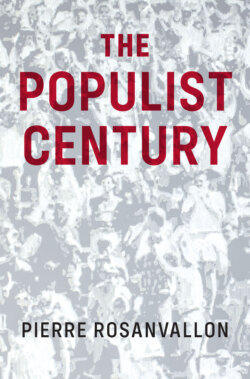Читать книгу The Populist Century - Pierre Rosanvallon - Страница 28
The return of political will
ОглавлениеFrom the protectionist perspective, the reign of free exchange and the globalization that comes with it are not evaluated solely from the standpoint of the economic and social balance sheet that can be drawn up, either globally or on specific points. They are denounced, first of all, as being vectors of the destruction of the political will. They are accompanied by a transfer of the governing authority to anonymous mechanisms, which precludes the possibility that peoples can have sovereignty over their own destinies. They sketch out a world presumed to be governed by “objective” rules, a world that rejects as incoherent the very idea of an alternative to the existing order.3 This dispossession is aggravated by the rise in power of independent authorities that develop wherever the reign of free trade and globalization has taken hold. Where European populisms are concerned, the European Union appears as the symbol and laboratory of this perverse confiscation of popular power by expert reasoning and the invisible hand of the market. From the populist standpoint, the EU illustrates in exemplary fashion the installation of a “government by numbers” that is superseding the exercise of political will.4
This critique underlay the success of the 2016 vote for Brexit in Great Britain: Boris Johnson and Nigel Farage had presented themselves as champions of the “can do” approach that would restore to the British people an active and beneficial sovereignty over their own destiny. If Johnson and Farage also set themselves up as champions of a certain liberalism in external trade, that liberalism remained fully inscribed within a nationalist vision of the economy. On the same basis, in France, Marine Le Pen persisted in denouncing the anonymous power of the “divine market,” depicting the European organization – accused of being the “avant-garde of globalism” – as the exemplar of a “horizon of renunciation.”5 Around the same time, the author of Jean-Luc Mélenchon’s economic program published a work with the evocative title Nous, on peut! (We Can Do It!),with an even more explicit subtitle: “Why and how a country can always do what it wants in the face of markets, banks, crises …”; the subtitle of its second edition (2012) presented the work as an “anti-crisis manual for the use of citizens.”6 This argument in favor of national protectionism was thus clearly intended to be embedded within a program aimed at refounding democracy, going far beyond an approach that would address the issue simply in terms of economic policy. For this reason, the argument is one of the keystones of the populist vision of the political will.
This political and democratic understanding of protectionism is also directly tied, in populist discourse, to an analysis of immigration. The development of an immigration policy is described as a process imposed on the country by the dominant classes in their quest for cheap labor, without explicit validation by any democratic decision.7 Thus, for populists, immigration entails an unacceptable bypassing of the popular will; it is the product of a capitalist strategy that has led to a downgrading and a weakening of the autochthonous popular classes. Extended to renewed control of migratory flows, the protectionist imperative is thus also viewed as contributing to a reinforcement of popular sovereignty. Here again, the political notion of sovereignty is wholly inseparable from the way economic and social questions are approached in the populist vision.
